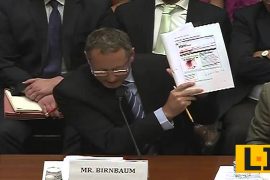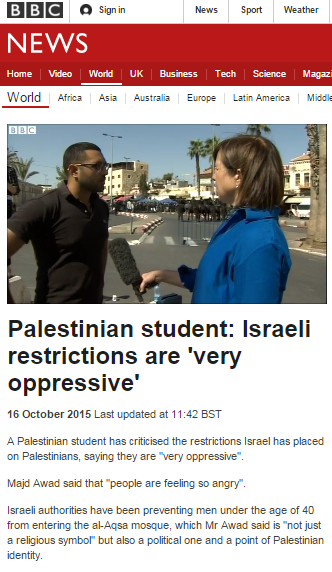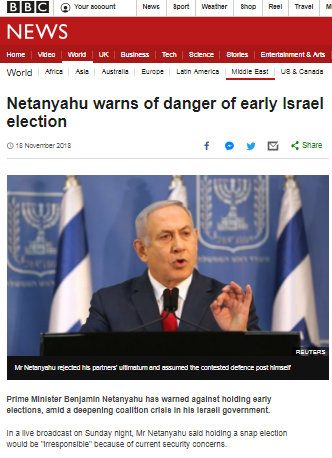Following the announcement that a framework agreement between the P5+1 and Iran had been reached, the BBC News website produced several articles which provided audiences with explanations of its terms.
In a report titled “Iran nuclear talks: ‘Framework’ deal agreed” from April 3rd, readers were provided with a link to a factsheet produced by the US administration.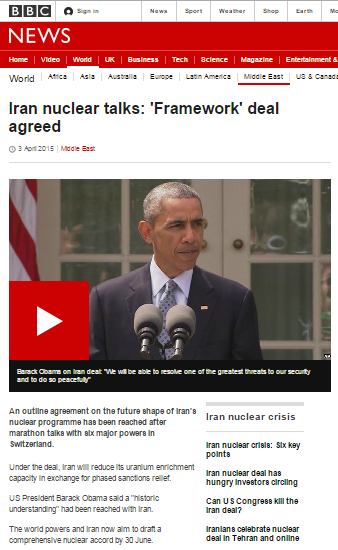
“According to a US factsheet issued after the talks, the outline deal includes the following conditions:
- Iran will reduce its installed centrifuges – used to enrich uranium – by two-thirds and reduce its stockpile of low-enriched uranium
- The centrifuges that are no longer in use will be placed in storage, monitored by the International Atomic Energy Agency (IAEA)
- All of Iran’s nuclear facilities will be subject to regular IAEA inspections
- Iran will redesign its heavy-water reactor in Arak so that it cannot produce weapons-grade plutonium
- US and EU sanctions related to Iran’s nuclear programme will be lifted in phases, but can be brought back if Iran does not meet its obligations.
Mr Obama said the deal’s implementation would be closely watched. “If Iran cheats, the world will know it,” he said, adding that the deal was based not on trust but on “unprecedented verification”.”
A link to that same factsheet also appeared in the April 3rd article titled “Iran nuclear talks: Obama hails ‘historic’ agreement“.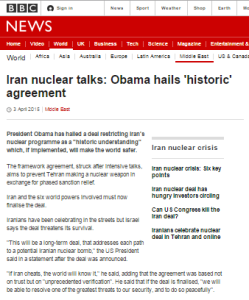
“According to “parameters” of the agreement published by the US state department, Iran must reduce the number of its centrifuges that can be used to enrich uranium into a bomb by more than two-thirds.
It also has to redesign a power plant so it cannot produce weapons-grade plutonium, be subject to regular inspections, and agree not to enrich uranium over 3.67% – far less than is required to make a nuclear bomb – for at least 15 years.
“There’s new state of the art technology that will be used,” US Secretary of State John Kerry told the BBC. “We will have tracking of their uranium from the cradle to the grave.””
Another article from April 3rd – “Iran nuclear talks: Hardliners criticise nuclear deal” – described the terms of the framework agreement as follows: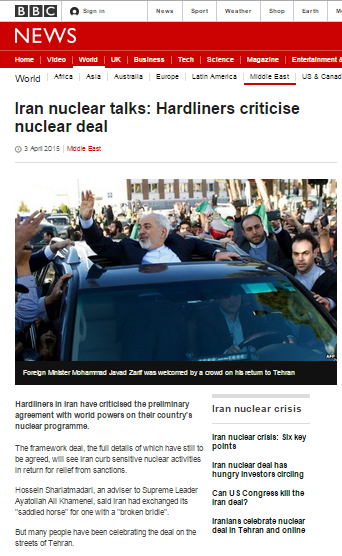
“US President Barack Obama said the framework agreement would make the world a safer place, as it would “cut off every pathway that Iran could take to develop a nuclear weapon”.
In addition to halting enrichment at Fordo, Iran will cut by more than two-thirds to 5,060 the number of centrifuges it currently operates to enrich uranium. While enriched uranium is used as fuel for nuclear reactors, it can also be used to make nuclear bombs.
Iran will also cut its stockpile of low-enriched uranium from around 10 tonnes to 300kg for 15 years, and the design of the heavy-water reactor under construction at Arak will be modified so it produces no weapons-grade plutonium.
In return, UN sanctions and separate measures imposed unilaterally by the US and EU will be gradually suspended as the global nuclear watchdog, the International Atomic Energy Agency (IAEA), confirms Iranian compliance.
The US says Iran has agreed to allow IAEA inspectors travel “anywhere in the country” to investigate “suspicious sites or allegations of covert enrichment”.”
The BBC’s diplomatic correspondent Jonathan Marcus produced an article on April 3rd titled “Iran nuclear deal: A result which buys time” in which the US administration’s factsheet was again promoted with a link.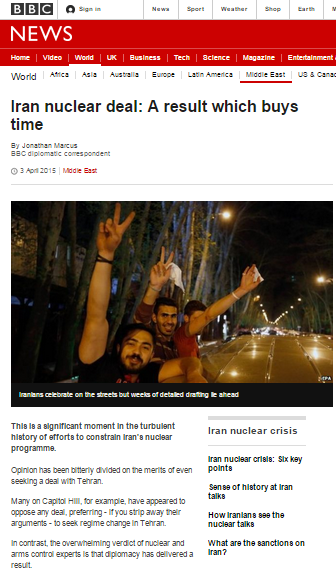
“What was expected from these talks was a fairly bland announcement that a framework agreement had been reached. In contrast the US State Department has been quick to publish a lengthy list of what it calls the “Parameters for a Joint Comprehensive Plan of Action” regarding Iran’s nuclear programme. […]
On the face of it Iran has made some significant concessions.
- Iran will be allowed to have some 6,104 centrifuges installed out of its current 19,000 and only a little over 5,000 of them will actually be enriching uranium. All the working centrifuges are to be early, less advanced models. And everything else is to be stored under supervision of IAEA inspectors
- Iran will reduce its stockpile of low-enriched uranium – the vital feedstock that would be needed to enrich further to get bomb-making material
- There will be no enrichment at the underground Fordow site for some 15 years
- Inspectors will have access not just to key nuclear facilities but to the supply chain supporting Iran’s nuclear programme and to uranium mines and mills
- Iran will be required to grant access to IAEA inspectors to investigate suspicious sites or suspected clandestine activities anywhere in the country
- The heavy water reactor at Arak that many feared would provide Iran with a plutonium route to a potential bomb is to be re-built so as not to produce weapons grade plutonium.
- Many of these constraints will be in place for 10 years and some will last for 15.
In return
- Iran will see US and EU nuclear-related sanctions suspended, though no clear timetable has been given for exactly how this will proceed
- It will not actually have to close any nuclear facility altogether
- It emerges, once the restrictions expire, with the basis for a significant nuclear industry.
Nonetheless, the level of detail is impressive and appears to have convinced nuclear experts that it does indeed provide the year-long warning of a potential Iranian break-out that has been the diplomats’ goal. That is seen as sufficient time for any Iranian effort to throw aside the deal and push towards enriching sufficient material for a bomb to be quickly spotted and action taken.
Strong verification provisions, along with continued intelligence efforts should also be sufficient to prevent an Iranian “sneak-out” – a clandestine effort to do the same thing.”
A backgrounder titled “Iran nuclear crisis: Six key points” – originally published on March 30th and previously discussed here – was updated on April 3rd but includes little information concerning the framework agreement itself except for the following: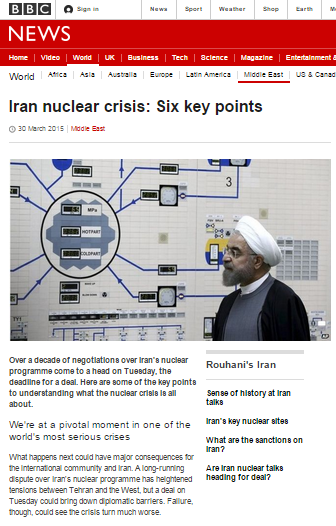
“According to the framework agreement, sanctions will be gradually phased out as the global nuclear watchdog, the International Atomic Energy Agency (IAEA), confirms Iranian compliance.”
As we see, the BBC’s presentation of the issue was based entirely upon statements put out by the American administration. That, however, was not the only published representation of the terms of the framework agreement: the Iranians put out their own factsheet which includes a number of statements contradicting the American – and hence BBC – version of the terms of the framework agreement.
For example, whilst the BBC claims that sanctions will be “gradually phased out” according to Iranian compliance, the Iranians themselves claim that:
“all of the sanctions will be immediately removed after reaching a comprehensive agreement”
Additional examples of discrepancies between the two factsheets are highlighted by journalist Amir Taheri in his comparison of the two texts – for example:
“The American statement claims that Iran has agreed not to use advanced centrifuges, each of which could do the work of 10 old ones. The Iranian text, however, insists that “on the basis of solutions found, work on advanced centrifuges shall continue on the basis of a 10-year plan.”
The American text claims that Iran has agreed to dismantle the core of the heavy water plutonium plant in Arak. The Iranian text says the opposite. The plant shall remain and be updated and modernized.”
Similarly, Israeli journalist Ehud Ya’ari has identified six points upon which American and Iranian interpretations of the framework agreement differ.
Whilst Jonathan Marcus reassured BBC audiences that anonymous “nuclear experts” appear to be convinced that the framework agreement “does indeed provide the year-long warning of a potential Iranian break-out”, one prominent named nuclear expert has raised the question of whether a one-year break-out time is indeed effective.
” [Olli] Heinonen, the International Atomic Energy Agency’s former top official for monitoring nuclear proliferation, expressed a range of concerns about the deal taking shape, warned of Iran’s history of deception, and also cautioned that the one-year framework for nuclear breakout pushed by the Obama administration might leave insufficient time for an international reaction to violations of the agreement.”
Emily Landau echoed that concern in a recent op-ed:
“… the US has made the case that 12 months is enough time to both detect and effectively deal with any violation, and that the agreed framework upholds this goal.
This can certainly be challenged, especially taking into account the chain of decisions that will need to be taken after a violation has been detected, all the way up to taking action to counter it. And this assumes there is initial agreement (among whom?) that the violation is “real” and significant enough to confront Iran. […]
But we also need to consider the second option that Iran has: the perhaps more realistic scenario whereby at some point Iran simply decides to exit the deal. In this scenario, Iran would most likely do so after accusing the West of not upholding its end of the bargain – on sanctions relief for example. So it wouldn’t be a case of an Iranian violation, but rather a decision to defect, using the excuse that the other side is not complying with the terms.
This is precisely what happened in 2004 – Iran reneged on the deal it had concluded with the EU-3 while accusing the EU-3 of bad behavior. If this happens regarding a future comprehensive deal, after Iran has ensured that it maintains a quick route to nuclear breakout, what would the options be to stop Iran?”
Clearly both the American and Iranian versions of the terms of the framework agreement were composed with political considerations – primarily domestic ones – in mind. However, the BBC chose to run with just one of those documents, promoting it as the only game in town and its content as authoritative.
Whilst those who have been following BBC coverage of the P5+1 negotiations with Iran (and related topics) for any length of time may not be overly surprised by the degree to which the corporation’s framing of this story reflects the messaging of the US administration, that narrow framing nevertheless prevents audiences from gaining a comprehensive understanding of the many questions still remaining before the BBC’s ‘best thing since sliced bread’ approach to this story can be justifiably described as accurate, impartial – and useful – reporting.

